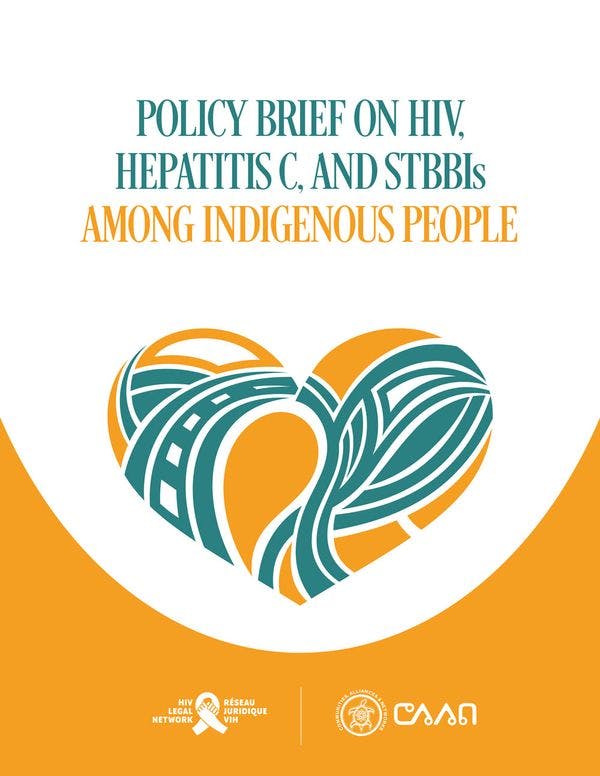Informe sobre el VIH, la hepatitis C y las infecciones de transmisión sexual entre la población indígena
La Red Jurídica sobre el VIH aboga por un enfoque basado en los derechos humanos, centrado en intervenciones basadas en pruebas y culturalmente sensibles que adopten las formas indígenas de saber y hacer. Más información, en inglés, está disponible abajo.
The strength and resilience of Indigenous Peoples in Canada is rooted within a rich diversity of cultures, traditions, and values that have long been nurtured by Indigenous health systems and healing practices. Despite this, Indigenous people have been — and continue to be — deeply affected by the history of colonialism, racism, and systemic discrimination in Canada. The final reports from the TRC and the MMIWG Inquiry clearly demonstrated how residential schools, the Sixties Scoop, and other manifestations of cultural oppression, structural violence, and abuse have resulted in long-lasting health impacts, intergenerational trauma, and economic and social marginalization for Indigenous peoples in this country. These systems of oppression have affected a range of social determinants of health, including income, education, employment, social status, working and living conditions, health practices, and child development. In turn, trauma and marginalization have contributed to higher and disproportionate rates of HIV, HCV, STBBIs, and TB among Indigenous people, which is exacerbated by ongoing discrimination and barriers that they face in their access to essential health care. In particular, Indigenous women face disproportionate rates of HIV, HCV, and STBBIs. As the TRC report puts it, “the residential school system was an attack on the health of generations of Aboriginal peoples, an attack first made visible by the physical scars of sickness and abuse, but also one that continues to punish Aboriginal peoples with a legacy of marginalized lives, addiction, mental health, poor housing, and suicide.” Compounding these determinants of health, Indigenous peoples continue to be subject to disproportionate levels of criminalization and incarceration that further fuel a cycle of disadvantage and human rights violations.
Effectively addressing HIV, HCV, and STBBIs among Indigenous people requires the adoption of a human rights approach, focusing on evidence-based and culturally sensitive interventions that embrace Indigenous ways of knowing and doing. In addition to the legal and policy recommendations described below, it is imperative moving forward that access to emerging health care technologies and new testing and treatment options be made truly equitable. The knowledge and benefits of scientific research and development (e.g. pre-exposure prophylaxis [PrEP], long-acting injectables, multiplex testing, self-testing, etc.) must be shared with all, so that Indigenous communities can achieve equitable outcomes in realizing the right to health.
At the same time, prohibitionist models based on criminalization have repeatedly failed to improve health outcomes and have instead caused great harm and damage, particularly for Indigenous communities. Practices and institutions, many of them interlinked, must be dismantled in order to holistically respond to the needs of Indigenous peoples and to uphold their rights, as per calls from the TRC report and the MMIWG Inquiry. In particular:
- Call for action 19 of the TRC report requires state actors to close gaps in health outcomes between Indigenous and non-Indigenous communities.
- Call for action 30 mandates that governments at all levels commit to eliminating the overrepresentation of Indigenous people in custody.
- Call for justice 3.1 from the MMIWG Inquiry requires state actors to ensure the equitable protection of the rights to health and wellness of Indigenous peoples (specifically women, girls, and 2SLGBTQQIA persons).
- Calls for justice 3.2, 3.4, 7.1, and 7.2 require state actors to properly fund and resource accessible and culturally appropriate health and wellness services for Indigenous communities, including trauma and addictions treatment programs.
Importantly, the specific needs and interests of Métis and Inuit people, particularly when it comes to health, must be considered alongside those of First Nations communities, as highlighted in calls 16.7 and 17.21 of the MMIWG Inquiry.
Additionally, there are various sources of international human rights law, which act as key reference points substantiating the positions in this policy brief. The most prominent of these is the UN Declaration, which Canada fully endorsed on the international stage in 2016 and incorporated into domestic law in 2021. The UN Declaration guarantees Indigenous peoples the right to the full enjoyment of all human rights and fundamental freedoms recognized by the United Nations Charter, the Universal Declaration of Human Rights, and international human rights law (article 1), particularly the right to non-discrimination (article 2), the right to life, physical and mental integrity, liberty and security of the person (article 7), the right to participate in decision-making on matters that affect their rights (article 18), the right to the improvement of economic and social conditions including in the area of health (article 21), the right to be actively involved in developing and determining health and social programming (article 23), and the equal right to the highest attainable standard of physical and mental health and the right to the maintenance of traditional health practices (article 24). As confirmed by the MMIWG Inquiry, Canada’s obligations under the international human rights framework can serve as valuable accountability mechanisms and benchmarks when it comes to improving outcomes for Indigenous Peoples.
